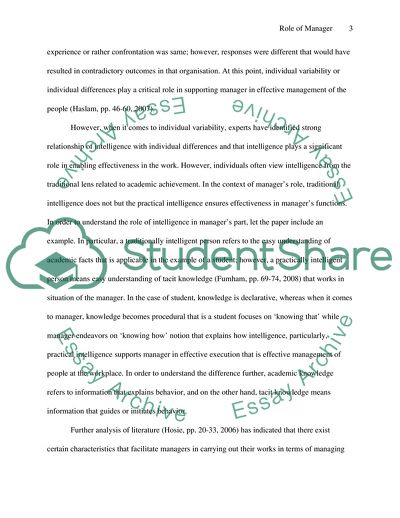Cite this document
(Role of Manager Essay Example | Topics and Well Written Essays - 1500 words, n.d.)
Role of Manager Essay Example | Topics and Well Written Essays - 1500 words. https://studentshare.org/human-resources/1752136-1-consider-the-role-of-a-manager-and-reflect-how-individual-differences-personality-and-intelligent-can-support-himher-in-the-effective-management-of-people-750-words-2-consider-the-role-of-a-manager-and-reflect-how-psychometric-assessments-can-su
Role of Manager Essay Example | Topics and Well Written Essays - 1500 words. https://studentshare.org/human-resources/1752136-1-consider-the-role-of-a-manager-and-reflect-how-individual-differences-personality-and-intelligent-can-support-himher-in-the-effective-management-of-people-750-words-2-consider-the-role-of-a-manager-and-reflect-how-psychometric-assessments-can-su
(Role of Manager Essay Example | Topics and Well Written Essays - 1500 Words)
Role of Manager Essay Example | Topics and Well Written Essays - 1500 Words. https://studentshare.org/human-resources/1752136-1-consider-the-role-of-a-manager-and-reflect-how-individual-differences-personality-and-intelligent-can-support-himher-in-the-effective-management-of-people-750-words-2-consider-the-role-of-a-manager-and-reflect-how-psychometric-assessments-can-su.
Role of Manager Essay Example | Topics and Well Written Essays - 1500 Words. https://studentshare.org/human-resources/1752136-1-consider-the-role-of-a-manager-and-reflect-how-individual-differences-personality-and-intelligent-can-support-himher-in-the-effective-management-of-people-750-words-2-consider-the-role-of-a-manager-and-reflect-how-psychometric-assessments-can-su.
“Role of Manager Essay Example | Topics and Well Written Essays - 1500 Words”. https://studentshare.org/human-resources/1752136-1-consider-the-role-of-a-manager-and-reflect-how-individual-differences-personality-and-intelligent-can-support-himher-in-the-effective-management-of-people-750-words-2-consider-the-role-of-a-manager-and-reflect-how-psychometric-assessments-can-su.


